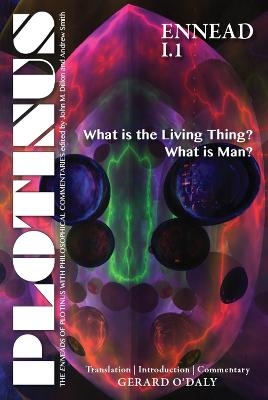
Plotinus Ennead I.1
What is the Living Thing? What is Man? Translation, with an Introduction, and Commentary
Seiten
2017
Parmenides Publishing (Verlag)
978-1-930972-98-8 (ISBN)
Parmenides Publishing (Verlag)
978-1-930972-98-8 (ISBN)
A succinct and concentrated analysis of key themes in Plotinus' psychology and ethics. It focuses on the soul-body relation, discussing various Platonic, Aristotelian, and Stoic views before arguing that there is only a soul-trace in the body (forming with the body a “compound”), while the reasoning soul itself is impassive and flawless.
Ennead I.1 is a succinct and concentrated analysis of key themes in Plotinus' psychology and ethics. It focuses on the soul-body relation, discussing various Platonic, Aristotelian, and Stoic views before arguing that there is only a soul-trace in the body (forming with the body a “compound”), while the reasoning soul itself is impassive and flawless. The soul-trace hypothesis is used to account for human emotions, beliefs, and perceptions, and human fallibility in general. Its problematic relation to our rational powers, as well as the question of moral responsibility, are explored. Plotinus develops his original and characteristic concept of the self or “we,” which is so called because it is investigated as something common to all humans (rather than a private individual self), and because it is multiple, referring to the reasoning soul or to the “living thing” composed of soul-trace and body. Plotinus explores the relation between the “we” and consciousness, and also its relation to the higher metaphysical entities, the Good, and Intellect.
Ennead I.1 is a succinct and concentrated analysis of key themes in Plotinus' psychology and ethics. It focuses on the soul-body relation, discussing various Platonic, Aristotelian, and Stoic views before arguing that there is only a soul-trace in the body (forming with the body a “compound”), while the reasoning soul itself is impassive and flawless. The soul-trace hypothesis is used to account for human emotions, beliefs, and perceptions, and human fallibility in general. Its problematic relation to our rational powers, as well as the question of moral responsibility, are explored. Plotinus develops his original and characteristic concept of the self or “we,” which is so called because it is investigated as something common to all humans (rather than a private individual self), and because it is multiple, referring to the reasoning soul or to the “living thing” composed of soul-trace and body. Plotinus explores the relation between the “we” and consciousness, and also its relation to the higher metaphysical entities, the Good, and Intellect.
Gerard O’Daly is Emeritus Professor of Latin at University College London and former Dean of its Faculty of Arts and Humanities. His research has concentrated on philosophy and literature in late antiquity, and his books include Plotinus’ Philosophy of the Self (1973), Augustine’s Philosophy of Mind (1987), The Poetry of Boethius (1991), Augustine’s City of God: A Reader’s Guide (2004), and Days Linked by Song: Prudentius’ Cathemerinon (2012). Several of his articles are collected in Platonism Pagan and Christian: Studies in Plotinus and Augustine (2001).
| Erscheinungsdatum | 08.01.2018 |
|---|---|
| Reihe/Serie | The Enneads of Plotinus |
| Verlagsort | Las Vegas |
| Sprache | englisch |
| Maße | 127 x 191 mm |
| Gewicht | 260 g |
| Themenwelt | Geisteswissenschaften ► Philosophie ► Philosophie Altertum / Antike |
| ISBN-10 | 1-930972-98-9 / 1930972989 |
| ISBN-13 | 978-1-930972-98-8 / 9781930972988 |
| Zustand | Neuware |
| Haben Sie eine Frage zum Produkt? |


